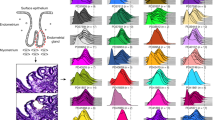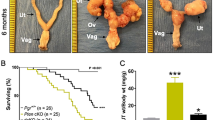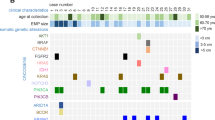Abstract
In order to identify the possible role of the DCC gene in neoplasms of the human female reproductive tract, messenger RNA expression of the DCC gene was examined by reverse transcriptase-polymerase chain reaction, and expression of the DCC gene product was detected immunohistochemically. While histologically normal endometrium, cervical epithelium and ovary expressed detectable mRNA of the DCC gene, three of eight (37%) endometrial carcinomas, one of two (50%) cervical carcinomas and 9 of 22 (41%) ovarian malignant tumours had significantly reduced or negligible DCC expression, and another endometrial carcinoma and two other ovarian tumors underexpressed DCC when compared with histologically normal endometrial or ovarian tissues. Impaired DCC mRNA expression was detected more frequently in grade 3 ovarian epithelial tumours than in grade 1 tumours (P = 0.002). Loss of expression of the DCC gene product detected by immunohistochemistry significantly correlated with the loss of mRNA expression in ovarian carcinomas (P = 0.01 by chi-square test) or in both endometrial and ovarian carcinomas combined (P = 0.001). Loss of heterozygosity of the DCC gene was also evaluated by restriction fragment polymorphism analysis of the polymerase chain reaction-amplified DNA fragment. Loss of heterozygosity of the DCC gene was detected in one of seven (14%) informative cases of endometrial carcinomas, 1 of 11 (9%) informative cases of cervical carcinomas and two of six (33%) informative cases of ovarian tumours. These results demonstrate that inactivation of the DCC gene, especially by the loss of expression, plays a significant role in the aetiology of neoplasms of the human reproductive tract.
This is a preview of subscription content, access via your institution
Access options
Subscribe to this journal
Receive 24 print issues and online access
$259.00 per year
only $10.79 per issue
Buy this article
- Purchase on Springer Link
- Instant access to full article PDF
Prices may be subject to local taxes which are calculated during checkout
Similar content being viewed by others
Author information
Authors and Affiliations
Rights and permissions
About this article
Cite this article
Enomoto, T., Fujita, M., Cheng, C. et al. Loss of expression and loss of heterozygosity in the DCC gene in neoplasms of the human female reproductive tract. Br J Cancer 71, 462–467 (1995). https://doi.org/10.1038/bjc.1995.94
Issue Date:
DOI: https://doi.org/10.1038/bjc.1995.94



